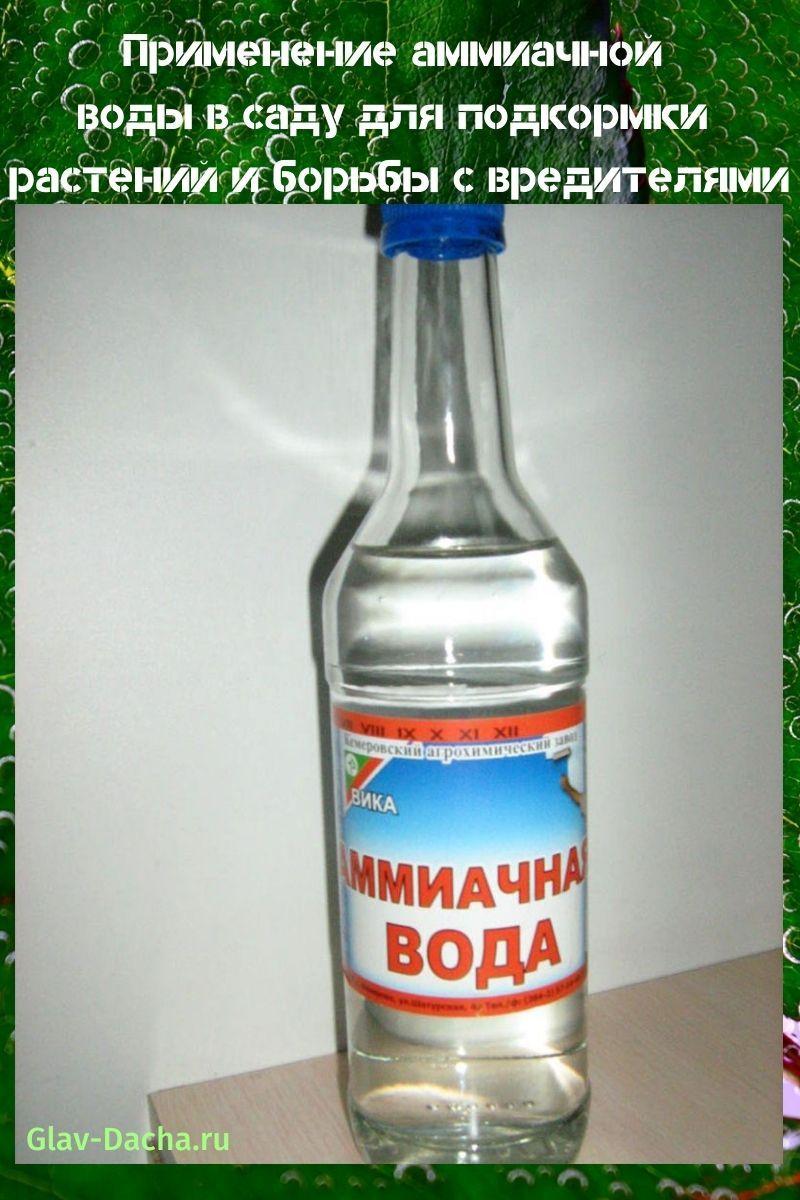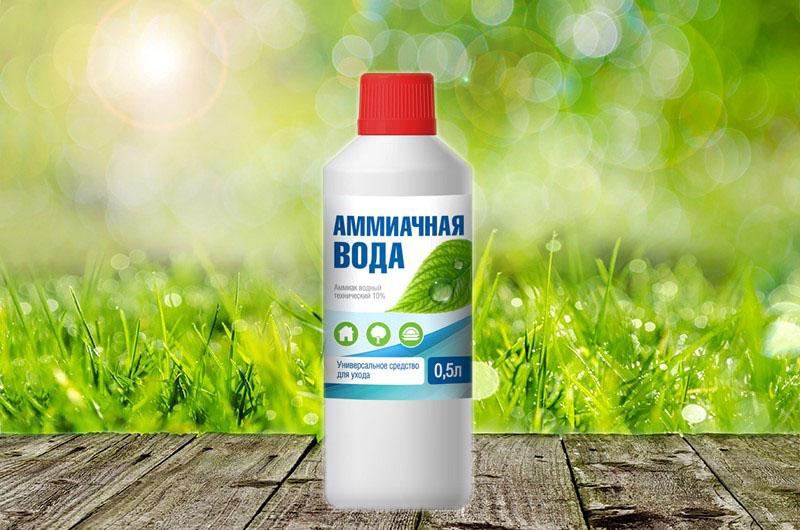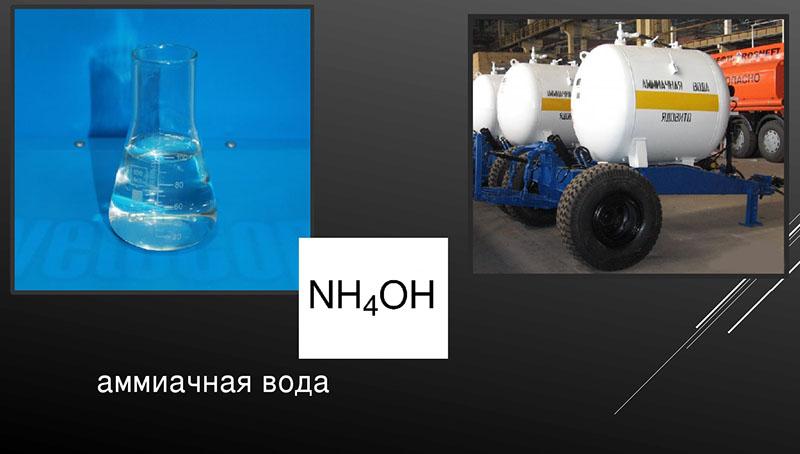Application of ammonia water in the garden for plant nutrition and pest control
 Ammonia water is a liquid nitrogen fertilizer that is widely used in the agricultural industry. The use of ammonia water in the garden stimulates the development of the root system and vegetative mass of plants, increasing yields and strengthening resistance to pests and diseases.
Ammonia water is a liquid nitrogen fertilizer that is widely used in the agricultural industry. The use of ammonia water in the garden stimulates the development of the root system and vegetative mass of plants, increasing yields and strengthening resistance to pests and diseases.
Ammonia water - formula and description

To prepare the solution, both synthetic and coke-chemical ammonia are used. The chemical composition of ammonia water is represented by 70% water and 30% ammonia, of which 23-25% is nitrogen available to plants.

There are three ways of industrial production of ammonia water:
- enrichment of the gaseous fraction of ammonia - passing through water and further cooling;
- combining ammonia and an aqueous base in a liquid state under pressure;
- feeding the dosed volume of the constituent ingredients into the mixer.
These technologies are used on an industrial scale. Summer residents can buy ready-to-use slurry at specialty gardening stores. Most often it has a concentration of 25-30%. If you need to get water from ammonia with a lower concentration, the store solution can be diluted with clean water to the required proportions.
Benefits of Ammonia Water for Garden Plants
 Ammonia water is a versatile product that is used for both horticultural and horticultural crops. It helps to saturate plants with beneficial nutrients and get rid of insect pests.
Ammonia water is a versatile product that is used for both horticultural and horticultural crops. It helps to saturate plants with beneficial nutrients and get rid of insect pests.
When applied to the soil, the ammonia solution turns into salts or nitrates of nitric acid. They are processed by plant cells into amino acids, which are an important building block for horticultural crops.
Benefits of using ammonia water in the garden:
- versatility - this top dressing can be used on any type of soil and for any horticultural crops;
- ease of use - it is much easier to apply a liquid solution than fertilizer in the form of powder or granules;
- low cost relative to other fertilizers;
- ammonia water provides a long-lasting effect, remaining in plant cells and soil throughout the entire flowering period;
- ammonia water is evenly distributed in the soil layers, saturating garden crops with nitrogen in the optimal amount;
- when used correctly, the product is absolutely safe for people and pets.
When used in the garden, ammonia water has a pronounced insecticidal effect, thanks to which it helps in the fight against various insect pests - bear, wireworm, hidden proboscis, weevil, aphids.
Application of ammonia water in the garden
 When properly prepared, ammonia water is of immense benefit to garden plants. It strengthens the root system, accelerates the development of green mass, improves flowering and increases crop yields.
When properly prepared, ammonia water is of immense benefit to garden plants. It strengthens the root system, accelerates the development of green mass, improves flowering and increases crop yields.
Basic rules for processing with ammonia water:
- spraying is carried out only in dry and calm weather;
- ammonia water should not be used to treat young seedlings, as this can burn them;
- when preparing a working solution, the indicated proportions must be strictly observed;
- ammonia fertilization cannot be combined with the introduction of manure, as this leads to a sharp increase in the concentration of nitrogen in the soil;
- ammonia contributes to soil acidification, therefore, 7-10 days after application, the soil is liming;
- the ammonia solution should not be stored, it should be used immediately after preparation.
Ammonia water for fertilization is used in the proportion of 1.5-2 tablespoons of the preparation per 10 liters of pure water. Do not increase the concentration of ammonia, as this can burn the plant root system. If the proportions are reduced, feeding will not bring any result.
Features of the use of ammonia water
 The introduction of ammonia water is best done in the fall, after harvest, when the soil will be cleared of plant residues and weeds... At the same time, the daytime air temperature should not exceed + 12 °, and the nighttime - 0 °. It is advisable to apply ammonia dressing in the evening - this will prevent the release of volatile nitrogen.
The introduction of ammonia water is best done in the fall, after harvest, when the soil will be cleared of plant residues and weeds... At the same time, the daytime air temperature should not exceed + 12 °, and the nighttime - 0 °. It is advisable to apply ammonia dressing in the evening - this will prevent the release of volatile nitrogen.
Ammonia water is introduced into the soil 10-12 cm. A cultivator can be used for this purpose. When treating plants from pests, a sprayer with a jet spray is used.
Proportions and regulations for the use of ammonia water:
- Row crops - 450-550 g per 100 sq. m.
- Tomatoes and cucumbers - 550-600 g per 100 sq. m.
- Garlic and onion beds - 600-700 g per 100 sq. m. Top dressing must be carried out every 10-14 days.
- Fruit trees and shrubs - 600-750 g per 100 sq. m. Ammonia water is used for signs of wilting crops.
Ammonia is used for strawberries and strawberries. Fertilization is carried out three times - before the beginning of the growing season, and also after its completion. The last time ammonia water is applied is after harvest.
The use of ammonia water from pests
 A solution of ammonia water can be used both to combat insect pests and to prevent their appearance in the garden.
A solution of ammonia water can be used both to combat insect pests and to prevent their appearance in the garden.
This tool will prevent the appearance of a bear in the beds with white cabbage and ornamental crops. The easiest way to make ammonia water is to mix 10 ml of ammonia with 10 liters of pure water. When planting a plant, pour 0.5 liters into each well. The same concentration of ammonia water is used when fighting wireworms.
Ammonia water is used to combat the lurker. To destroy this pest, prepare a working solution of 10 liters of clean water and 25 ml of ammonia.
The product is highly effective against onion and carrot flies. The optimal concentration of ammonia water is 5 ml per bucket of water.
Security measures
 The use of ammonia water requires strict adherence to safety measures. This remedy has a specific, pungent odor that can cause headache, dizziness, and loss of consciousness.
The use of ammonia water requires strict adherence to safety measures. This remedy has a specific, pungent odor that can cause headache, dizziness, and loss of consciousness.
If it comes into contact with the skin, ammonia water causes severe burns. That is why it is necessary to work with fertilizer only with protective gloves and a respirator.
When using ammonia water, you need to consider its compatibility with other dressings. It cannot be combined with lime, ash and other alkaline dressings. Also, ammonia cannot be combined with other nitrogen-containing dressings - this leads to the accumulation of nitrates in the soil and plants.
 Ammonia water is an effective product that is widely used in horticulture and horticulture. This solution helps to saturate the soil with nutrients and provide plants with useful nitrogen for the entire growing season. Ammonia strengthens and improves the development of the root system and aboveground parts of crops, increases productivity and effectively protects against garden pests.
Ammonia water is an effective product that is widely used in horticulture and horticulture. This solution helps to saturate the soil with nutrients and provide plants with useful nitrogen for the entire growing season. Ammonia strengthens and improves the development of the root system and aboveground parts of crops, increases productivity and effectively protects against garden pests.